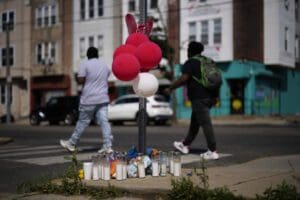After mass shooting in Philadelphia, advocates and lawmakers push for gun reform
The city filed a lawsuit against the two largest ghost gun suppliers in the country.

On July 2 and 3, a Philadelphia man shot seven people, killing five. The mass shooting is the latest in the ongoing gun violence epidemic in the city, prompting renewed urgency on the part of gun safety advocates, as well as state and local politicians, to reform the state’s gun control laws.
“This country must re-examine its conscience and figure out how to get guns out of dangerous hands,” Philadelphia Democratic Mayor Jim Kenney tweeted after the shooting. “This was a terrible and tragic situation that traumatized a community. We are begging Congress to protect lives and do something about America’s gun problem.”
Pennsylvania’s Democratic members of Congress, Reps. Mary Gay Scanlon, Brendan Boyle, and Dwight Evans, released a statement criticizing House Republicans for blocking legislation to ban assault weapons and enforce background checks. “We are once again calling upon Republican leaders to stand up to the gun lobby and bring this legislation to a vote in the House of Representatives,” the statement said.
In the aftermath of the shooting, the city of Philadelphia filed a lawsuit against Polymer80, Inc. and JSD Supply, two of the largest suppliers of ghost guns that have been confiscated in the city. According to police, the shooter used two ghost guns, the term used for firearm kits and parts that anyone can buy to build their own gun. Because they are sold as parts, ghost guns aren’t subject to the same regulations as regular guns, meaning that they’re available to buy without a background check, and don’t contain a serial number, making them virtually untraceable.
The city said in a statement that its lawsuit alleges the two companies “have perpetuated the gun violence crisis and threatened the public’s right to health and safety by marketing, selling, and dispersing unserialized ghost gun kits into Philadelphia.” Nearly 10% of guns recovered from crime scenes in Philadelphia were ghost guns, according to Philadelphia Police Commissioner Danielle Outlaw. The lawsuit seeks to stop the ghost gun suppliers from continuing to do business in Philadelphia and to require the two companies to pay for damages and create an abatement fund to help the communities affected by their products.
Adam Garber, the executive director of CeaseFirePA, a gun safety advocacy organization, applauded the lawsuit, saying in a statement that the two companies are responsible for “the escalation of Philadelphia’s gun violence epidemic, the endangerment of our communities, and the loss of too many lives.”
Even if it’s successful, the lawsuit won’t solve Pennsylvania’s gun violence crisis. Earlier this year, the Pennsylvania House of Representatives passed two bills to address the state’s gun violence problem. One is a so-called red flag law that would allow authorities to temporarily seize an individual’s firearm if they are judged to be a danger to themself or others. It passed in a 102-99 vote, with two Republicans joining Democrats in favor of the bill, according to the Associated Press. The other bill, which would expand and strengthen the background checks required to buy a gun, passed in a 109-92 vote, with nine Republicans voting with the Democrats.
Garber told the American Independent Foundation that it was “hugely significant” that the bill made it through the House with bipartisan support. “It’s the first time in years that this kind of legislation has ever gotten this far, and especially with clear bipartisan support,” he said.
But the bills haven’t yet seen any movement in the commonwealth’s Republican-controlled Senate.
“Many of the senators have talked and talked about the gun violence epidemic, they have talked about the need for action,” Garber said. “And if the majority is going to put their money where their mouth is, then they need to take up these bills and have a serious discussion around them.”
Published with permission of The American Independent Foundation.
Recommended

New NC GOP chair flirts with bogus stolen election conspiracies
Simmons predecessor was a staunch 2020 election denier
By Jesse Valentine - April 19, 2024
Texas activists pushed abortion restrictions in NM cities and counties, records show
Emails reveal influence and control in exchange for promises of legal help
By Austin Fisher, Source NM - March 04, 2024
Cannabis workers across Missouri begin push to unionize dispensaries
The first day was a breeze. Sean Shannon and Danny Foster walked into several marijuana dispensaries around Missouri with their matching “Union For Cannabis Workers” shirts and talked to employees about the possibility of unionizing. “The first day, there were 57 stops amongst the teams,” said Shannon, lead organizer with UFCW Local 655, which actually […]
By Rebecca Rivas - December 04, 2023










































































